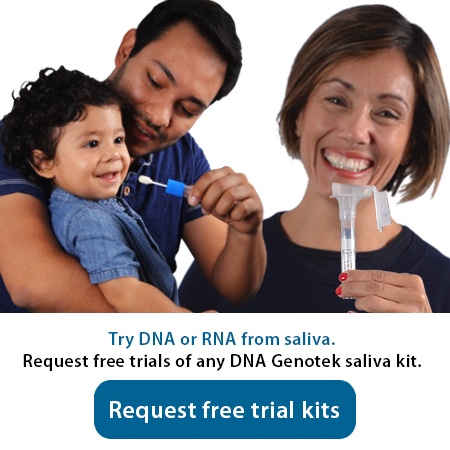2010-04-14
For the second year in a row, DNA Genotek collected DNA samples onsite at the National Walk for Epilepsy on March 27th, 2010 in Washington, DC. Our participation in this event supports the efforts of the Columbia University Family Studies in Epilepsy Program and their study which is designed to identify genes that play a role in causing epilepsy. While at the Epilepsy Walk, I had the opportunity to interview Janine Rose, Research Associate at Columbia University about their epilepsy research and how Oragene•DNA has helped their study.
Shauna White, DNA Genotek: I'm here with Janine Rose with the Columbia University Family Studies in Epilepsy and we're here at the National Walk for Epilepsy in Washington DC in March of 2010. Janine, thanks for joining us today, it's great to have you here.
Janine Rose, Research Associate, Columbia University Family Studies in Epilepsy: Thanks for having us.
Shauna: Can you tell me about the research study you're working on and what you hope to achieve with it?
Janine: Yes. We are a genetic research program at Columbia University and what we're looking to discover are the genes that affect certain types of epilepsies, childhood epilepsies, specifically idiopathic generalized epilepsy and idiopathic generalized epilepsy is a type of epilepsy that doesn't have an origin, a set origin. So we are looking to recruit subjects for this particular kind of epilepsy and by DNA saliva, we look at what these genes do and further identify in hopes that further down the road, finding a cure or new therapy for these patients.
Shauna: Why did you decide to collect DNA with saliva samples?
Janine: For many reasons. Before, and that was before my time (with the study) they would collect blood as you know it is less likely to find subjects willing to go through that donation. It is very difficult to store, it needs to be refrigerated, there can be pain, there are very many reasons, it can be messy. I think that the saliva is small and portable and light and extremely practical - a super easy way to collect and people are delighted to participate and enchanted to look at how they are made and it's a great conversation piece. It breaks the ice every time so we are very happy with the product. We use it very willingly.
Shauna: This brings me to our work here this week at the National Walk for Epilepsy. When you heard about this event, you obviously saw a way to help your study. What did you think about and why did you get involved?
Janine: Well, I was involved the first time last year which I participated with Columbia University Family Studies. The year previous I came as a participant and I noticed at the event how many sponsors they had and I thought well, why not us? I thought that as direct sponsor, I would like for us to be involved because I saw a real number of people who would definitely embrace this project and people that would either be willing to participate or donate in some way and support what we are doing. And finding people is what this is all about. At the moment we use mostly physician referrals to find our subjects so I thought why not come directly here and show them what we're doing at Columbia. Even if they're not qualified to join the study, if they don't have epilepsy, they could at least be an unaffected control which is what we're hoping to collect today. If we get the funding to go on with the study, then further down the road it's our goal to include other types of seizures if we get funding to do so.
Shauna: How has DNA Genotek helped you with this project?
Janine: I have to say that we wouldn't be here today if it weren't for DNA Genotek. We are very very grateful for the help that you've provided us. First of all, getting the booth, getting the space, helping us organize the event. It's been a real sharing experience for both of us. I think it's a very good fit. People see exactly how we get the DNA and having them (DNA Genotek) personally on hand here on the spot to have them answer any questions they may have about the product or project is great. We're very very pleased.
Shauna: Tell me a little about the future of the study. When do you think you'll have some results? When will people know the outcome of this study?
Janine: It's very difficult to predict - to put a time period on such a momentus study because every time you find something new it takes you in a new direction. With our funding, it allows us to go so far. As more funding comes along, we hope to increase our study. Our investigation is about how epilepsy comes. Of course we're working to point very specifically at what can be done at the appropriate times. For the moment, we're still at the investigation stage. But we found a true confirmation of genetic information. We feel that is a very good study both for reasons of our specificity. We are very strict about our criteria - our inclusion criteria. This allows us to know exactly what we're looking at. We don't cloud it with other things.
Shauna: Thank you so much for taking the time today. Best of luck with the National Walk for Epilepsy and best of luck with the study.
Janine: Thank you, thank you for having us.


